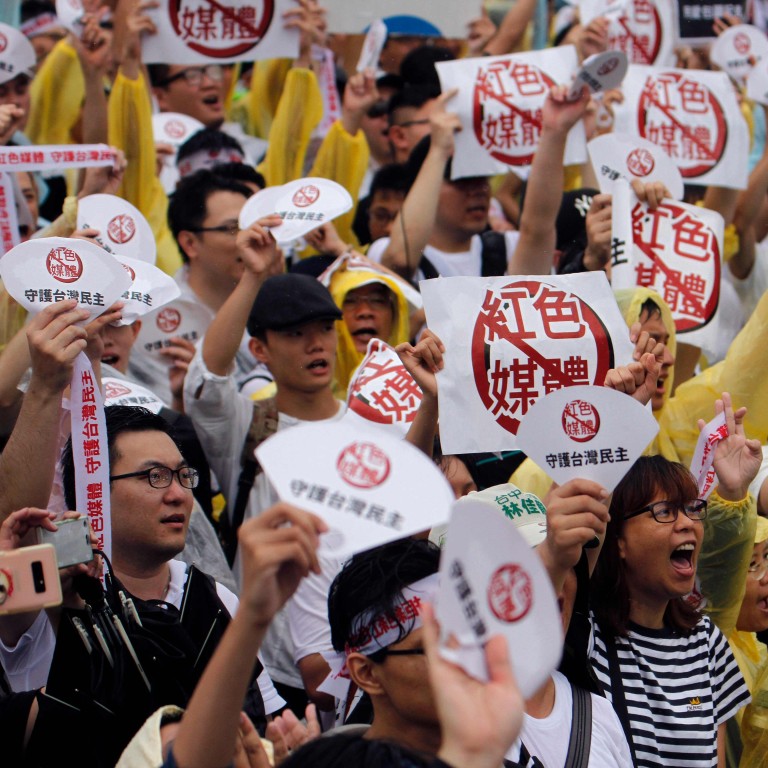
Taiwan gets tough over fake news blamed on Beijing ‘disrupting its democracy’
- Over 100 prosecuted and tougher penalties planned after false stories such as claim Taiwanese government funded Hong Kong protests
- Justice ministry investigating whether mainland is funding preferred candidates for January’s elections or giving orders to media outlets
A 70-year-old woman in New Taipei City was fined NT$30,000 (US$960) last week for spreading fake information, becoming the latest of more than 110 people prosecuted under the island’s social order maintenance law since the authorities decided in December to take tougher action against disinformation.
According to New Taipei City police, the 70-year-old was found to have spread an untrue story through a group on the social network Line, claiming that Taiwan President Tsai Ing-wen gave NT$4.5 billion to Haiti as a gift during her Caribbean visit this month but refused adequate funds for Kaohsiung mayor Han Kuo-yu – from the main opposition Kuomintang – to combat the worsening dengue fever.
Last month, the island’s criminal investigation bureau asked Facebook to remove a post saying the Tsai government spent NT$1 billion funding anti-government protesters in Hong Kong in their “violent march” against the city’s controversial extradition bill yet offered nothing to Kaohsiung for dengue fever. It was later discovered that the man who published the post used fake identification to register for an account in Singapore.
“Fake news like this has become rampant since the local government elections last year,” Huang Ming-chao, commissioner of the bureau, said. “We have suspected it came from China, but we don’t have direct evidence proving that, because the IP addresses of those spreading the disinformation often link to Singapore and other countries.”
Huang said the police had set up a special task force to cope with a deluge of fake news and disinformation that was damaging the government’s image and creating disorder on the island.
Taiwan’s legislature is also reviewing proposals to introduce tougher penalties, by increasing the fine to up to NT$300,000 and jail terms to up to six months, to try to discourage the spread of fake news. At present, the maximum penalty is a NT$30,000 fine or three days in detention.
Meanwhile, the Taiwanese justice ministry’s investigation bureau, which operates like the United States’ FBI (Federal Bureau of Investigation), has been probing whether the mainland is funding the campaigns of its preferred candidates for Taiwan’s presidential and legislative elections, which will take place in January.
Beijing seeks to build ties with Taiwanese cities
“In addition to bribery, violence and the spreading of fake news, we are also looking into the overseas factors that could affect the elections,” bureau director Lu Wen-chung said in a news conference last month.
He was referring to allegations that some local news media outlets had received instructions from Beijing in their coverage of cross-strait and local news.
In March, the Paris-based global watchdog Reporters Without Borders (RSF) released a report saying Taiwan was the main target of Beijing’s disinformation operation.
According to RSF, Beijing has exerted its influence on global media in the past 10 years by pumping money into its international television broadcasting, acquiring foreign media outlets, buying vast quantities of advertisements, infiltrating foreign media, and using extortion, intimidation and harassment to threaten press freedom around the world.
Calling Beijing the perpetrator of red media and disinformation in Taiwan, Tsai and Premier Su Tseng-chang have asked the public to be aware of the consequence brought by fake news and red media.
‘Fake news’ Chinese journalist is refused entry by Taiwan
“In the lead-up to [January], fake news and rumours originating from China are expected to continue to spread everywhere, to try to hamper our election and democracy,” Su said, adding that police and Taipei’s agencies needed to put a stop to it to ensure the elections could be held fairly.
“It is crystal-clear China wants to annex Taiwan,” Su said, adding that Beijing’s efforts to disrupt the island also involved cyber armies spreading disinformation, and buying online networks or other media on the island.
“Their main purpose is to create public misunderstanding and resentment towards the government, to facilitate its attempt to annex Taiwan.”

